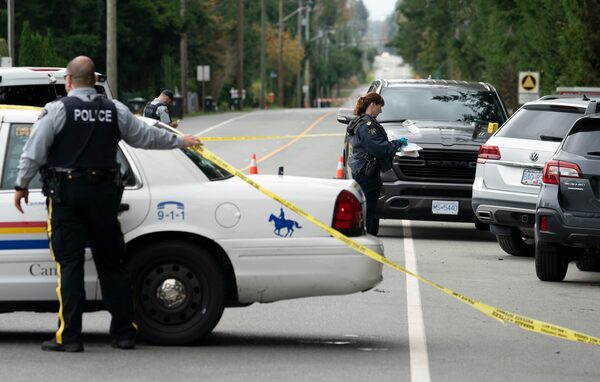Ken Hansen retired from the Royal Canadian Navy in 2009 in the rank of commander. Angelo Caravaggio is the executive director of C9Leadership and retired from the Canadian Armed Forces as a lieutenant-colonel in 2012.

RCMP attend a serious incident in Langley, B.C. on Oct. 8, 2020.JONATHAN HAYWARD/The Canadian Press
The work environment in the Royal Canadian Mounted Police is “toxic and tolerates misogynistic and homophobic attitudes amongst its leaders and members.” This culture has caused “incalculable damage” to female members of the RCMP and public-service members. “A change in the culture of the RCMP is essential.”
These are among the condemnations of the federal police force in former Supreme Court justice Michel Bastarache’s November report, “Broken Dreams, Broken Lives.” That report uncovered a toxic work environment for women and LGBTQ2S+ persons throughout the RCMP – one that leaders have tolerated and the organizational culture has reinforced – and makes recommendations in 16 broad thematic areas, ranging from recruitment standards to the needs of leadership.
However, the recommendations do not specifically include a more comprehensive approach to education throughout the career of a member of the RCMP. The report contains only some side references to the need to educate leaders on issues of sexual harassment. It observes that officers with post-secondary education seem less likely to commit such acts, and recommends that recruits have at least two years of post-secondary education. However, the report suggests these educational requirements must be met via programs that are not part of the RCMP’s training system.
Research shows that ego and misdirected leadership practices are at the core of toxic behaviour. The RCMP should eschew simple training and establish formal professional education that would prepare officers for their unique responsibilities as their careers and rank advance. Professional development is too important to be left to on-the-job osmosis that, according to the report, is more likely to result in bad behaviour being inculcated by the toxic culture.
Professional education is already a core requirement of military forces in Canada and around the world. In 1969, the holistic Rowley Report – so nicknamed after its primary author, Officer Development Board chair Major-General Roger Rowley – established a need for education of the officer corps that reflected new defence and security complexity and the increasing responsibility that comes with higher rank. Together, we have 23 years of experience with the design and delivery of a multitude of courses for mid-grade and senior military officers preparing for new command and staff duties. Military and academic experts from around the world are also teaching intellectually and ethically challenging material. In 2002, the Canadian Defence Academy was created and affiliated with Queen’s University to act as the institutional champion for professional development in the armed forces. The academy ensures that the design and development of programs is a vigorous process to, in its words, “better prepare our officers and non-commissioned members for the evolving complexity and ambiguity of our security environment into the future.”
Most professions are governed by professional bodies or colleges. They regulate professional standards of education, training and certification, and they establish a code of conduct for all members. Police institutions in Canada, including the RCMP, have civilian oversight, but are not governed by a professional body. There is no college of policing to set professional standards for education, professional development and conduct for all officers in Canada. Each province has its own standards, as does the RCMP.
If the RCMP hopes to develop its future leaders from within, it will require progressive education at crucial junctures, reinforced by an organizational culture that values every member. Candidates to take the courses would be chosen through an unbiased, merit-based assessment. Courses would prepare the officers for their next level of responsibility with education based on the latest and best methodologies presented by professional and civil experts. Professional values would be taught, reinforced and debated at each level.
You cannot change an organization’s culture without changing the attitudes of the people within it. Regular exposure to penetrating analytical study and probing discussions on the values, purpose and capabilities of the profession are the keys to institutional change and organizational learning. Ideally, these would take place in colloquium-style study groups – which maximize student participation in delivering the material – with their fellow officers.
Mr. Bastarache’s report is a reminder of the sage words of Australian Lieutenant-General David Morrison: “No one has ever explained to me how the exploitation or degradation of others enhances capability or honours the traditions of the Australian army.” The leaders of the RCMP should have to explain the same. When a profession fails, it puts its clients at risk – and in the RCMP’s case, that’s all Canadians.
Keep your Opinions sharp and informed. Get the Opinion newsletter. Sign up today.